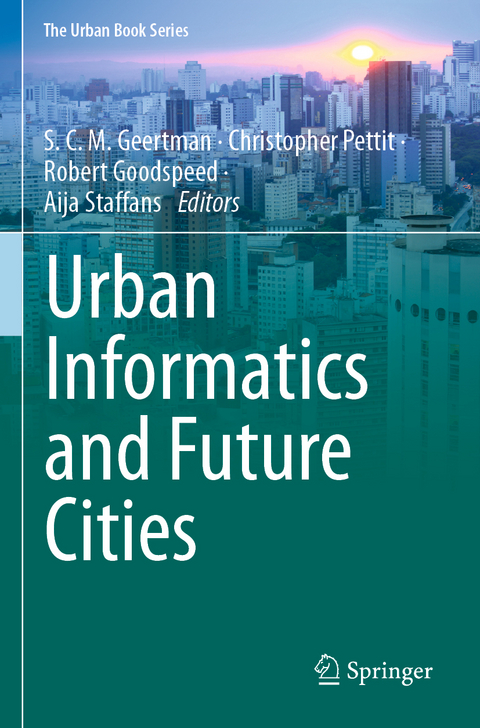
Urban Informatics and Future Cities
Springer International Publishing (Verlag)
978-3-030-76061-8 (ISBN)
Prof. S. C. M. Geertman is full Professor in Planning Support Science and Chair of Spatial Planning at Utrecht University in the Netherlands. He has published widely in (inter-)national journals and has edited a range of scientific books in the field of Planning Support Science. He is/was (co-)editor of several international peer-reviewed journals (e.g., ASAP - Applied Spatial Analysis and Policy) and serves on the editorial boards of diverse scientific journals (e.g. CEUS - Computers, Environment, and Urban Systems). He has been chair/member of several international conference organizations (EGIS; JECC; AGILE-2011; DDSS; CUPUM-2013) and was for the past 10 years Chair of the International Board of Directors of CUPUM (Computational Urban Planning and Urban Management). He has participated in numerous interdisciplinary research projects, ranging from 'Climate change and sustainable land use' to 'Spatial economic deconcentration'. For 10 years he was the scientific director of an academic spin-off of Utrecht University (Nexpri) and was one of the founding fathers and first program director of the inter-university Master program GIMA (Geographical Information Management and Applications). His research interest can be categorized under the heading 'Planning Support Science for Sustainable Urban Futures'.
Introduction.- Part I: Data analytics and the COVID-19 pandemic.- Smart governance and COVID-19 control in Wuhan, China.- Using public-private data to understand compliance with mobility restrictions in Sierra Leone.- Development of a spatio-temporal analysis method to support the prevention of COVID-19 infection: Space-time Kernel density estimation using GPS location history data.- Part II: Big data and smart cities.- A review of spatial network insights and methods in the context of planning: Applications, challenges, and opportunities.- Transport infrastructure, Twitter and the politics of public participation.- Public perceptions and attitudes towards driverless technologies in the United States: A text mining of Twitter data.- Assessing the value of new big data sources for transportation planning: Benton Harbor, Michigan case study.- How various natural disasters impact urban human mobility patterns: A comparative analysis based on geotagged photos taken in Tokyo.- Revealing the spatial preferences embedded in online activities: A case study of Chengdu, China.- Part III: Data-driven research of activity patterns.- Application for locational intelligence and geospatial navigation (ALIGN): Smart navigation tool for generating routes that meet individual preferences.- Pedestrian behaviour characteristics based on an activity monitoring survey in a university campus square.- Developing a GIS-based tourist walkability index based on the AURIN walkability toolkit - Case study: Sydney CBD.- Sequential patterns of daily human activity extracted from person trip survey data.- Understanding the economic value of walkable cities.- (Big) data in urban design practice: Supporting high-level design tasks using a visualization of human movement data from smartphones.- Examining passenger vehicle miles traveled and carbon emissions in the Boston metropolitan area.- Part IV: Open data and spatial modeling.- Development of a household urban micro-simulation model (HUMS)using available open-data and urban policy evaluation.- An agent-based bushfire visualisation to support urban planning: A case study of the South Coast, NSW 2019-2020.- Development of an agent-based model on the decision-making of dislocated people after disasters.- Evidence-based design justice: Synthesizing statistics and stories - to create future "Just" cities.- Part V: Geodesign and planning support systems (PSS).- Geodesign between IGC and geodesignhub: Theory and practice.- The role of technology tools to support geodesign in resilience planning.- Planning support systems for long-term climate resilience: A critical review.- Part VI: Geospatial data analysis.- Aggregation of geospatial data on "street units": The smallest geographical unit of urban places.- Local betweenness centrality analysis of 30 European cities.- Model for estimation of building structure and built year using building façade images and attributes obtained from a real estate database.- A spatial analysis ofcrime incidence and security perception around a university campus.- Sightseeing support system with augmented reality and no language barriers.- GeoMinasCraft: A serious geogame for geographical visualization and exploration.
| Erscheinungsdatum | 19.07.2022 |
|---|---|
| Reihe/Serie | The Urban Book Series |
| Zusatzinfo | XII, 632 p. 223 illus., 181 illus. in color. |
| Verlagsort | Cham |
| Sprache | englisch |
| Maße | 155 x 235 mm |
| Gewicht | 1082 g |
| Themenwelt | Mathematik / Informatik ► Informatik |
| Naturwissenschaften ► Geowissenschaften ► Geografie / Kartografie | |
| Schlagworte | Big Data and Data Analytics • Geo-Information Science • Planning Support Science and Systems • Smart Urban Futures • Spatial Planning and Management • urban planning |
| ISBN-10 | 3-030-76061-8 / 3030760618 |
| ISBN-13 | 978-3-030-76061-8 / 9783030760618 |
| Zustand | Neuware |
| Haben Sie eine Frage zum Produkt? |
aus dem Bereich


